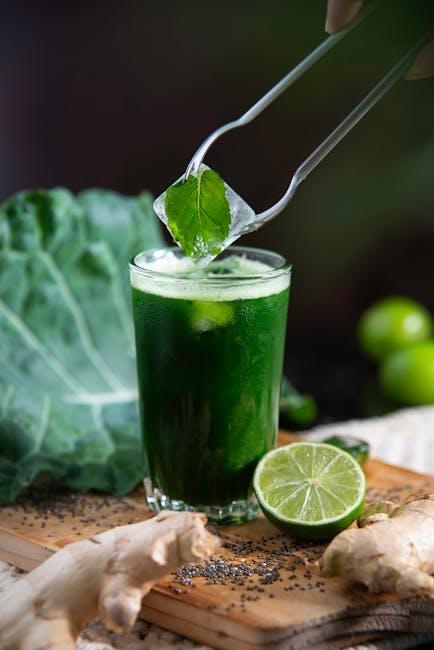In the intricate battleground of the human body, the immune system stands as a vigilant guardian, tirelessly defending against an array of unseen invaders. But like any well-equipped soldier, it requires the right fuel to perform at its best. What we eat doesn’t just sustain our energy; it plays a pivotal role in shaping our immune resilience. “” explores the fascinating connection between nutrition and immunity, revealing how thoughtful food choices can strengthen our natural defenses and empower our body’s ability to ward off illness. Join us as we delve into the science behind the nutrients that bolster immune function and discover how everyday meals can become a strategic frontline in maintaining health.
Table of Contents
- The Building Blocks of Immunity Essential Nutrients That Strengthen Your Body’s Defenses
- Gut Health and Immune Response Exploring the Role of Probiotics and Fiber
- The Influence of Hydration on Immune Efficiency Practical Tips for Staying Optimally Hydrated
- Dietary Habits to Avoid Foods That Weaken Immunity and Support Wellness Through Balanced Choices
- In Conclusion

The Building Blocks of Immunity Essential Nutrients That Strengthen Your Body’s Defenses
Our immune system operates like a complex fortress, tirelessly working to protect us against invading pathogens. At the core of this defense are vitamins and minerals that act as essential messengers and builders. Nutrients such as Vitamin C and Vitamin D enhance the activity of white blood cells, while Zinc supports the production and function of immune cells. Without these critical nutrients, the immune response can become sluggish, leaving the body more vulnerable to infections. Incorporating a variety of nutrient-rich foods daily ensures your body’s defense mechanisms are robust and responsive.
Other essential players include antioxidants and healthy fats, which help regulate inflammation and maintain the integrity of cell membranes. Foods rich in omega-3 fatty acids, like salmon and walnuts, assist in balancing immune signaling pathways. In addition, a sufficient intake of probiotics nurtures gut health, where the majority of immune activity unfolds. Together, these elements create a finely tuned network that enables rapid response and recovery, emphasizing that immunity isn’t fueled by a single nutrient but a harmonious blend.
| Nutrient | Immune Role | Food Sources |
|---|---|---|
| Vitamin C | Boosts white blood cells | Citrus fruits, bell peppers |
| Vitamin D | Modulates immune response | Fatty fish, fortified dairy |
| Zinc | Supports cell function | Meat, nuts, legumes |
| Omega-3 Fatty Acids | Reduces inflammation | Salmon, flaxseeds |
| Probiotics | Promotes gut health | Yogurt, kimchi |

Gut Health and Immune Response Exploring the Role of Probiotics and Fiber
Our gut is more than just a digestion hub; it’s a bustling ecosystem where trillions of microbes play an essential role in immune defense. Probiotics, the beneficial bacteria found in fermented foods like yogurt, kimchi, and sauerkraut, act as frontline soldiers, modulating immune function and outcompeting harmful pathogens. Their presence helps maintain the delicate balance within the gut microbiome, which in turn primes immune cells and shapes inflammatory responses. Adding probiotics to your diet doesn’t just support digestion—it fortifies your body’s natural barrier against infections and chronic illnesses.
Fiber, often overlooked, is a crucial partner in this immune-boosting alliance. Soluble fiber acts as fuel for these good bacteria, promoting their growth and production of short-chain fatty acids (SCFAs), which have powerful anti-inflammatory effects. Insoluble fiber aids in regular bowel movements, helping eliminate potential toxins efficiently. Incorporating a variety of fiber-rich foods—such as fruits, vegetables, legumes, and whole grains—can be a game-changer. Below is a quick glance at how different types of fiber support gut health and immunity:
| Fiber Type | Primary Role | Immune Impact |
|---|---|---|
| Soluble | Prebiotic fuel for probiotics | Boosts anti-inflammatory SCFA production |
| Insoluble | Enhances bowel regularity | Supports toxin removal, reducing immune strain |
| Resistant Starch | Fermented by gut bacteria | Improves gut barrier integrity |

The Influence of Hydration on Immune Efficiency Practical Tips for Staying Optimally Hydrated
Optimal hydration acts as a silent guardian, ensuring every immune cell performs at its peak. Fluids are essential for the circulation of immune cells and the efficient removal of toxins and pathogens, creating a robust environment for defense mechanisms. When the body is adequately hydrated, the mucous membranes in the respiratory tract remain moist, acting as a first line of defense against invading microbes. Dehydration, even at mild levels, can slow down these essential processes, leaving the immune system less responsive to threats.
To maintain this vital balance, integrating simple habits into daily routines can make all the difference. Consider these practical hydration strategies:
- Start your day with a glass of room-temperature water to jumpstart immune functions.
- Incorporate hydrating foods such as cucumbers, watermelon, and citrus into meals.
- Set reminders to drink water consistently, especially during and after physical activity.
- Replace sugary drinks with herbal teas or infused water for added nutrients.
| Hydration Level | Immune Impact | Recommended Daily Intake |
|---|---|---|
| Well Hydrated | Optimal cell function, strong barrier defenses | 2.5 to 3 liters |
| Mildly Dehydrated | Reduced immune response, slower toxin clearance | Increase water intake promptly |
| Severely Dehydrated | Compromised immunity, increased infection risk | Immediate rehydration, medical advice |

Dietary Habits to Avoid Foods That Weaken Immunity and Support Wellness Through Balanced Choices
Optimal immune function hinges not only on nutrient intake but equally on steering clear of foods that can undermine your body’s natural defenses. Processed foods rich in added sugars and trans fats provoke chronic inflammation, which in turn disrupts immune signaling pathways. Limiting these can reduce oxidative stress, allowing immune cells to perform at their peak. Meanwhile, excess alcohol consumption impairs the body’s ability to ward off infections by hampering white blood cell function and gut health, the latter being critical as a vast portion of the immune system resides in the digestive tract.
Balancing your dietary choices means embracing nutrient-dense whole foods known to nurture immune resilience. Incorporate a colorful array of fruits and vegetables packed with antioxidants like vitamin C, selenium, and zinc, which serve as the immune system’s frontline reinforcements. Integrating lean protein sources and healthy fats, such as omega-3 rich fish and nuts, promotes cellular repair and inflammation control. Below is a simple guide summarizing key foods to minimize and those to uplift your immune well-being:
| Avoid | Embrace |
|---|---|
| Added sugars & sodas | Citrus fruits & berries |
| Trans fats & fried snacks | Leafy greens & cruciferous veggies |
| Excess alcohol | Fatty fish & nuts |
| Refined grains & processed meats | Whole grains & legumes |
In Conclusion
As we navigate the complex battleground of health, it becomes clear that every meal is more than just fuel—it’s an investment in our body’s frontline defense. By thoughtfully choosing the nutrients that power our immune system, we not only fortify our resilience against threats but also cultivate a foundation for lasting wellness. In the intricate dance between diet and immunity, it’s not about perfection but consistency—small, intentional choices that collectively build a stronger, healthier you. After all, the best defense starts on your plate.



